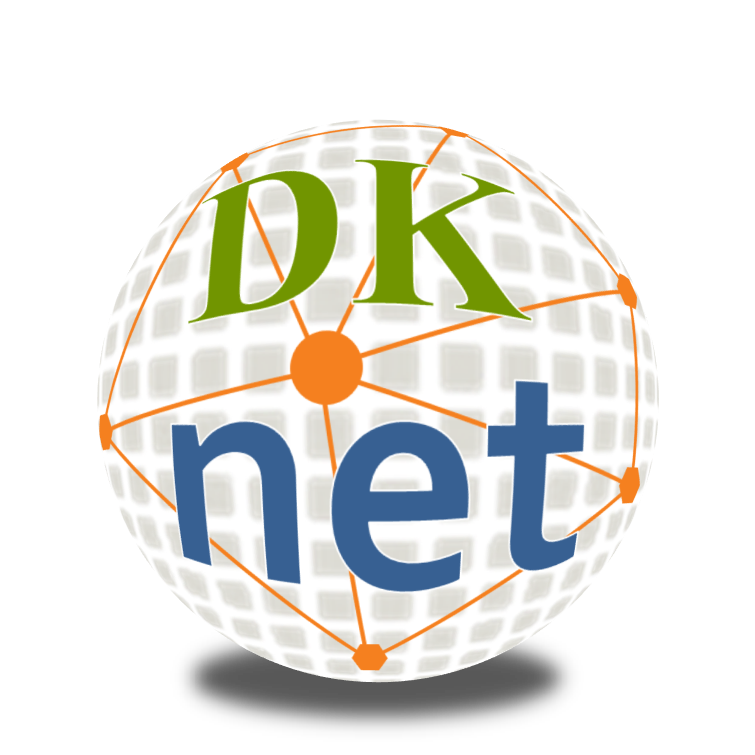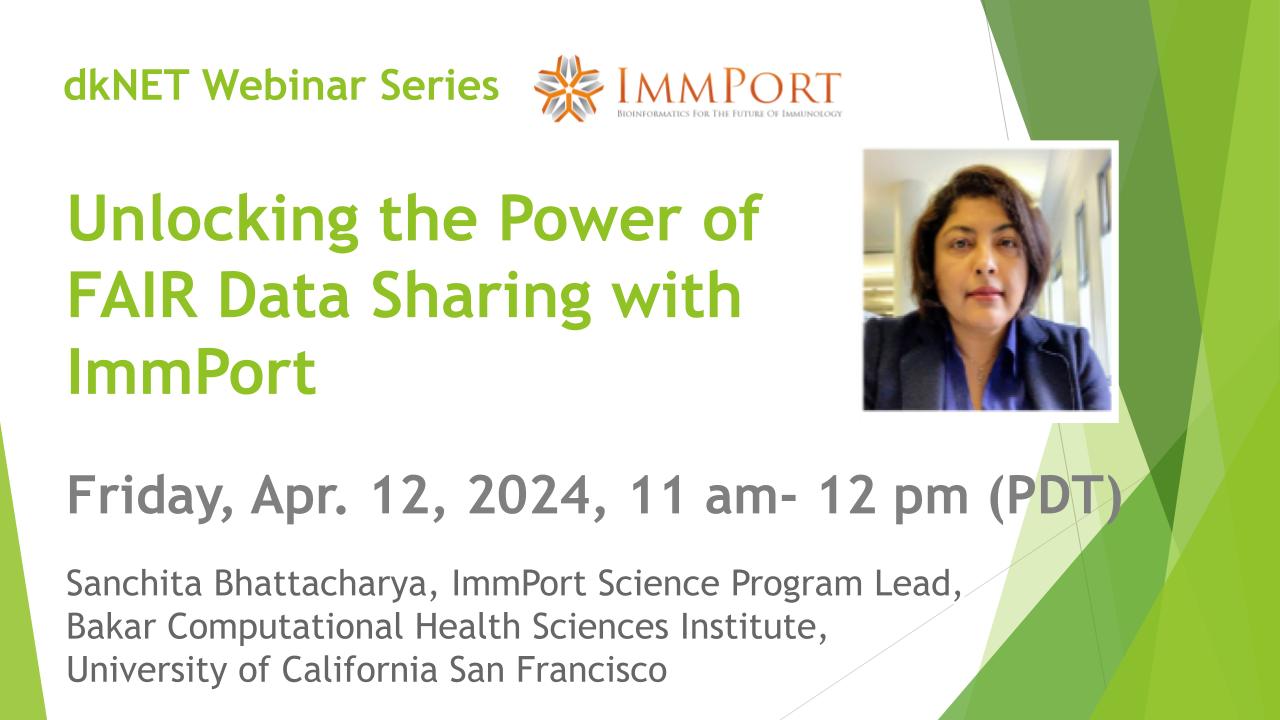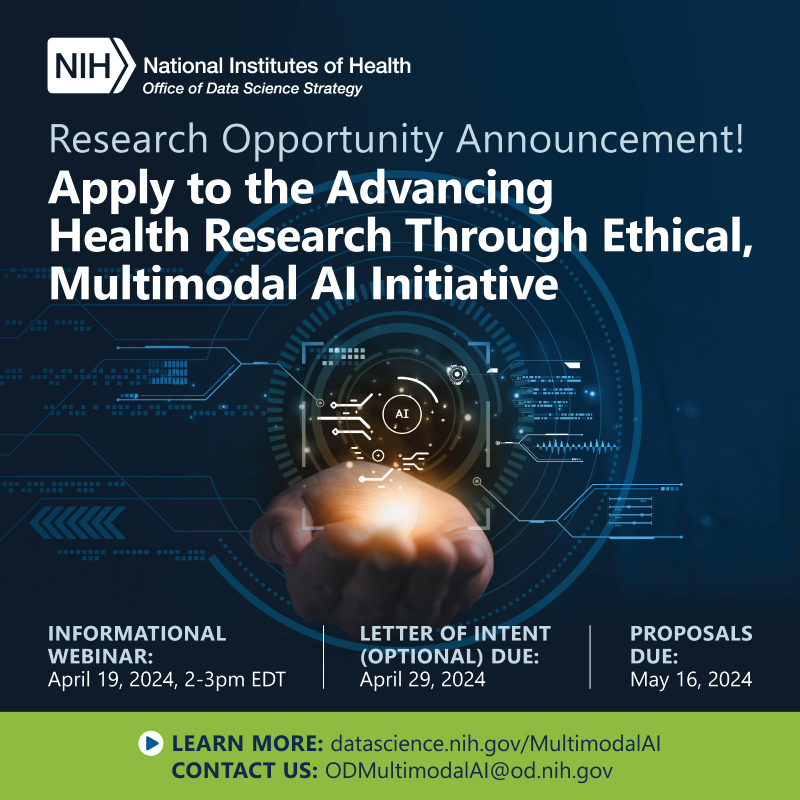Leaving Community
Are you sure you want to leave this community? Leaving the community will revoke any permissions you have been granted in this community.
dkNET community events and announcements in March, 2018
Dear dkNET Community,
dkNET provides updates on activities of interest to the NIDDK-supported community. You could keep up to date on these activities through our Twitter feed @dkNET_info, through our Community Calendar, or through dkNET e-mail list. If you have an event or funding opportunities you'd like to advertise, please contact us info_at_dknet.org.
dkNET Announcements
dkNET team will attend ENDO 2018 during March 17-19, 2018 in Chicago, IL. Come meet us if you are attending ENDO 2018. You will also have opportunity to preview dkNET 3.0 beta!
Schedule and location:
- March 17-19, 2018, ENDOExpo booth# 4424
- Saturday, March 17, 2018, 1:00 – 3:00 PM, Poster presentation at poster board# SAT-730
- Saturday, March 17, 2018, 2:00 – 2:40 PM, Science hub oral presentation at ENDOExpo Booth# 2419
Events in March, 2018
Mar. 6, 2018
American Society for Biochemistry and Molecular Biology (ASBMB) The Duel Conference
The Deuel Conference meets for two and one-half days annually at various West Coast locations and centers around an aspect of lipid metabolism. The Conference consists of five sessions and maintains an informal atmosphere, encourages free and open discussion, and is a forum for presentation of new and unpublished data. Attendees enjoy the informality and the Deuel conference provides the depth and breadth of expertise necessary for a high quality conference. Participation is by investigators in the field of lipids and lipoproteins from the around the world. Interested scientists are invited to register to attend the meeting and encourage trainees to submit abstracts.
Location: Coronado, CA, USA
More information: https://www.asbmb.org/deuelconference/
Mar. 6, 2018
Registration deadline: The Islet Biology Workshop
Islets Society Meeting 2018; 6-7 September, 2018 at Vanderbilt Diabetes Research and Training CenterT
More information: http://www.isletsociety2018.com/
Mar. 7, 2018
7th International Singapore Lipid Symposium
The Singapore Lipid Symposium (biennial, since 2006) has rapidly evolved into a key event to keep up to date for novel developments in lipidomics in Asia Pacific. Based on past experience, we are expecting participation of approximately 150-200 from around the world and representation from a wide range of areas in the life sciences across academia and industry.
Location: Singapore
More information: http://sling.sg/news-events/isls/
Mar. 8-11, 2018
2018 HIRN Annual Investigator Meeting
An in-person meeting of the members of the Human Islet Research Network (HIRN) is held annually. The meeting consists of scientific sessions, breakout sessions, poster sessions as well as consortium-specific meetings. Attendees include investigators, trainees, NIH staff, Coordinating Center (CC) and Bioinformatics Center (BC) as well as invited guests (i.e. dkNET, Helmsley Charitable Trust, IIDP, JDRF, nPOD and the T1DExchange). .
Location: Washington DC
More information: https://hirnetwork.org/overview/annual-meetings
Mar. 8-9, 2018
NIDDK Workshop: Autophagy as a Common Pathway in Diseases 2018
Autophagy is a carefully choreographed cellular response to stress and environmental changes. The cell creates specific structures to facilitate targeted degradation of components in lysosomes, thereby recycling materials and adjusting cellular contents to suit the new environmental conditions. In recent years, researchers have implicated disruptions of autophagy in numerous diseases within the National Institute of Diabetes and Digestive and Kidney Diseases (NIDDK) mission. These include cystinosis, the systemic amyloidoses, tuberous sclerosis, acute tubule necrosis, and ciliopathies. The purpose of this conference is to bring together autophagy researchers and those working on NIDDK-relevant disease biology to explore potential common mechanisms and to discuss potential therapeutic development strategies. If successful, this meeting will promote new collaborations and avenues of investigation that identify novel diagnostic tools and new interventions and improve clinical outcomes for diseases relevant to the NIDDK’s mission.
Location: Bethesda, MD, USA
More information: https://www.niddk.nih.gov/news/meetings-workshops/2018/autophagy-common-pathway-diseases
Mar. 16, 2018
Abstract Submission Deadline: T14th Annual Conference of the Metabolomics Society
The Metabolomics Society is an independent, non-profit organization, governed by a Board of Directors composed of dedicated members of the metabolomics community but ultimately responsive to its members. The Metabolomics Society's vision is to become the premier organization devoted to the development of metabolism-based research.
Location: Seattle, WA, USA
More information: http://www.metabolomics2018.org/
Mar. 17-20, 2018
ENDO 2018 (*dkNET team will be there!)
ENDO is the world’s largest event for presenting and obtaining the latest in endocrine science and medicine. With an extensive program covering a broad array of topics, various networking opportunities, poster sessions, updates on new products and technologies at the ENDOExpo, and more, attendance at ENDO is essential for enhancing your professional development and building your reputation.
Location: Chicago, IL, USA
More information: https://www.endocrine.org/endo-2018
Funding opportunities information and deadlines in March, 2018
Mar. 1, 2018
Funding Opportunity Application Due Date: Academic-Industrial Partnerships to Translate and Validate in vivo Cancer Imaging Systems (R01 Clinical Trial Optional)
The purpose of this Funding Opportunity Announcement (FOA) is to stimulate translation of scientific discoveries and engineering developments in imaging or spectroscopic technologies into methods or tools that address problems in cancer biology, risk of cancer development, diagnosis, treatment, and/or disease status. A distinguishing feature of each application will be formation of an academic-industrial partnership, which is a strategic alliance of investigators in academic, industrial, and any other entities who work together as partners to identify and translate a technological solution or mitigation of a cancer-related problem.The goals for proposed technologies are imaging applications in clinical trials, clinical research, non-clinical research, and/or patient care. Among other possibilities, they may include pre-clinical imaging investigations or investigations that combine patient specimens and pre-clinical methods, or optimizations of methods across different commercial platforms, sites, or time.
More information: https://grants.nih.gov/grants/guide/pa-files/PAR-18-009.html
Mar. 1, 2018
Funding Opportunity Application Due Date: UCSD - UCLA Diabetes Research Center Pilot And Feasibility Program
The DRC P&F mechanism will fund innovative new projects that will explore the feasibility of novel testable concepts and enhance the endocrine/diabetes research scope within the institutions. A special emphasis on promoting promising junior faculty involved with diabetes research is key to the UCSD/UCLA P&F mission. It is expected that P&F studies will generate preliminary data that will be used by these investigators in diabetes/endocrinology-related R01 applications in the years following their award.The DRC is also please to announce a new partnership with the CTSIs at UCLA, Cedars and UCSD to specifically support clinical and/or translational research relevant to diabetes. The DRC strongly encourages submission of pilot and feasibility proposals in this area. Eligibility: All eligible investigators must have faculty appointments at UCLA, Salk, Cedars, or UCSD, and be independent investigators.
More information: https://dknet.org/about/funding
Mar. 12, 2018
Funding Opportunity Application Due Date: Early-Stage Preclinical Validation of Therapeutic Leads for Diseases of Interest to the NIDDK
The overarching goal of this Funding Opportunity Announcement (FOA) is to translate basic science research into knowledge and tools that can be utilized to provide strong justification for later-phase therapeutics discovery and development efforts in health-related outcomes relevant to the National Institute of Diabetes and Digestive and Kidney Diseases. This includes outcomes relevant to obesity, diabetes and related aspects of endocrinology and metabolism, digestive diseases, liver diseases, nutrition, kidney and urological diseases, hematology, and specific aspects of cystic fibrosis. Additional information concerning programmatic areas at NIDDK is available at: www.niddk.nih.gov/research-funding/research-programs/Pages/default.aspx.
Its objective is to stimulate research and technology development to promote the early-stage preclinical validation of therapeutic leads (that need not be finalized therapeutics, henceforth called "therapeutic leads") such as small molecules or non-viral biologics (e.g. antibodies, cell-based therapies, engineered tissue constructs, probiotic or commensal microbes) that are not currently a focus within the biotechnology and pharmaceutical industries. It is expected that there is significant novelty in either the target, small molecule, or non-viral biologic itself, or in the approaches used to pursue further therapeutic lead validation, and that this is articulated clearly in the application. It is not intended to support research focused on understanding normal biology, disease processes, or generating lists of putative new targets.
At the end of the project period, a successful project will have provided a significant contribution to the data supporting the validity of modulating a target’s activity for safe, efficacious treatment of a disease using a small molecule or non-viral biologic approach.More information: https://grants.nih.gov/grants/guide/pa-files/PAR-16-121.html
Mar. 13, 2018
Funding Opportunity Application Due Date: Studies of HIV in Digestive Diseases Limited to Gastrointestinal Mucosal Immunology and Liver Diseases (R01 Clinical Trial Optional)
The goal of this FOA is to support innovative, basic and translational research in two areas, gastrointestinal (GI) mucosal immunology and liver disease. The emphasis for GI mucosal immunology is on elucidation of mechanisms whereby innate and adaptive immunity in the GI tract interacts with HIV infection in the presence or absence of antiretroviral therapy (ART) and contributes to HIV infection, persistence, disruption of GI homeostasis, and pathogenesis. The emphasis for liver disease is on pathophysiologic mechanisms of injury to the liver and the biliary system during HIV infection and epidemiological studies of liver diseases and disorders in HIV patients.More information: https://grants.nih.gov/grants/guide/rfa-files/RFA-DK-17-038.html
Mar. 15, 2018
Funding Opportunity Application Due Date: Vanderbilt Digestive Disease Research Center Pilot Project
The Pilot and Feasibility Project Program (P/F) is designed to provide Vanderbilt investigators the opportunity to explore nascent, meritorious hypotheses related to digestive diseases with the ultimate goal being acquisition of external funding. The Vanderbilt Digestive Disease Research Center (VDDRC) plans to fund pilot projects annually. Awards will be made for 1-2 years in duration.More information: https://ww2.mc.vanderbilt.edu/ddrc/6938
Mar. 16, 2018
Funding Opportunity Application Deadline: Chronic Kidney Disease (CKD) Biomarkers Consortium Pilot and Feasibility Program
The CKD Biomarkers Consortium Pilot and Feasibility Program is focused on the discovery, validation, or qualification of CKD biomarkers in adults and children. The CKD BioCon Scientific and Data Coordinating Center (SDCC) at The University of Pennsylvania administers this program. Successful pilot and feasibility studies serve as a basis for subsequent applications for independent research support. Typical awardees have either been early stage investigators or investigators who are pursuing new research directions related to CKD biomarkers. The program accepts applications from two focused areas: (1) Applications proposing studies of biomarkers that are measured in human blood, urine, or renal tissue, or extracted from radiographic/imaging data and that seek to address important research questions related to the occurrence, progression, and/or consequences of CKD. (2) Applications proposing the development and/or evaluation of new statistical methods relevant to biomarkers which are specifically related to CKD biomarkers.More information: http://www.ckdbiomarkersconsortium.org/biocon-funding-opp.html
Mar. 16, 2018
Funding Opportunity Application Due Date: Mayo Clinic Metabolomics Resource Pilot Projects And Feasibility Projects
The goal of the Pilot and Feasibility Program is to enhance metabolomics research crucial to translational projects by providing investigators who are new to the metabolomics field the opportunity to explore the use of metabolomics in their research and support high-risk and high-impact research.The Mayo Clinic Metabolomics Resource Core Pilot and Feasibility Program aims to form new multidisciplinary collaborations that will enhance the integration of the techniques offered at Mayo Clinic and benefit multiple investigators.Potential applicants are encouraged to link basic, translational and clinical research. Extending the collaborative nature of research projects with funds from other mechanisms is encouraged.More information: http://www.mayo.edu/research/centers-programs/metabolomics-resource-core/pilot-feasibility-grants/application-information
Mar. 16, 2018
Funding Opportunity Application Due Date: Resource Center For Stable Isotope-Resolved Metabolomics (RC-SIRM) Pilot And Feasibility Grant Program
The RC-SIRM at University of Kentucky provides extensive collaborative services and unique capabilities for metabolomics, with a strong emphasis on stable isotope resolved metabolomics (SIRM).The goal of the Pilot and Feasibility Program is to promote the use of metabolomics in translational research projects by providing analytical support for investigators – both new to and experienced in the metabolomics field – in the area of SIRM studies. SIRM requires experimental design, sample preparation, analyses, data processing, and biochemical interpretation that have unique challenges. Potential applicants are strongly encouraged to discuss potential projects with the RC-SIRM staff, in order to generate an appropriate study design that uses SIRM to address metabolic questions of pathways, networks, flux, apportionment of specific carbon, nitrogen, and other atoms (such as one-carbon metabolism, source of hydride in NADPH, etc.), and other areas that require SIRM technologies. Matching funds from other sources are encouraged. Data reduction and interpretation is usually extensive, and requires specialized knowledge and software tools. Various levels of assistance can be provided as appropriate. Eligibility: any researcher who is eligible to apply as a Principal Investigator (PI) for NIH funding may apply.Mar. 16, 2018
Funding Opportunity Application Due Date: Southeast Center For Integrated Metabolomics Pilot And Feasibility Projects
ECIM is now seeking proposals for 12-month pilot projects in metabolomics. The goal of this initiative is to enhance metabolomics research by providing support for investigators new to the field, the development of new teams and partnerships, and high-risk/high-impact research. Awards are intended to support projects that will provide preliminary data for new extramural grant application submissions. The review process will emphasize innovation and the potential of the work to have a significant impact on an important research problem. While proposals of up to $50,000 in total costs will be accepted, SECIM is dedicated to funding as many unique and innovative projects as possible with goals of expanding the center's capabilities and enhancing metabolomics research capacity across the nation. Thus, applications requesting $20,000 or less will receive preference over those with higher budgets. Requests for salary for the Principal Investigator or personnel, laboratory costs or extramural services outside of SECIM are not permissible. All funds will be awarded in credit toward SECIM services, or in payment for the project's materials and supplies.More information: http://secim.ufl.edu/pilot-funding/
Mar. 16, 2018
Funding Opportunity Application Due Date: The NIH Eastern Regional Comprehensive Metabolomics Resource Core (ERCMRC) Pilot And Feasibility Project
The goal of the P&F Program is to increase the use of metabolomics in basic, clinical, and translational research, by collaborating with investigators who are new to the field of metabolomics, by developing teams and partnerships, and by conducting high-risks/high-impact research. The P&F program aims to form new multidisciplinary collaborations that will enhance the integration of new techniques to benefit multiple investigators. Applicants are encouraged to link basic, clinical, and translational research. Extending the collaborative nature of the research projects by matching funds from other mechanisms is encouraged. Eligibility: All basic, translational, or clinical investigators located at institutions within the United States who are eligible to apply as a PI for NIH grants (https://grants.nih.gov/grants/who-is-eligible.htm). Young investigators and investigators who are new to the field of metabolomics are especially encouraged to apply.Mar. 16, 2018
NIDDK Funding Opportunity Application Due Date: Pilot and Feasibility Clinical and Translational Research Studies in Digestive Diseases and Nutrition (R21 Clinical Trial Optional)
This FOA encourages pilot and feasibility clinical and translational research studies of digestive and liver diseases.Mar. 16, 2018
NIDDK Funding Opportunity Application Due Date: Pilot and Feasibility Clinical Research Grants in Kidney Diseases (R21 Clinical Trial Optional)
This Funding Opportunity Announcement (FOA) is to support Exploratory/Developmental Research Grants (R21) that propose small scale or pilot and feasibility clinical and translational research studies, including epidemiological studies or clinical trials related to kidney disease research. Studies should address important clinical and translational questions and are potentially of high clinical and public health impact. It is anticipated that some projects supported by these grants may lead to full-scale clinical studies including diagnostic strategies, epidemiological studies, or randomized clinical trials of diagnosis, prevention, or treatment of kidney diseases.More information: https://grants.nih.gov/grants/guide/pa-files/PAR-18-100.html
Mar. 16, 2018
NIDDK Funding Opportunity Application Due Date: Pilot and Feasibility Clinical Research Grants in Urologic Disorders (R21 Clinical Trial Optional)
This Funding Opportunity Announcement (FOA) is to support Exploratory/Developmental Research Grants (R21) that propose small scale or pilot and feasibility clinical and translational research studies, including epidemiological studies or clinical trials related to urologic disorders research. Studies should address important clinical and translational questions that are potentially of high clinical and public health impact. It is anticipated that some projects supported by these grants may lead to full-scale clinical studies including diagnostic strategies, epidemiological studies, or randomized clinical trials of prevention, diagnosis or treatment of urologic disorders.More information: https://grants.nih.gov/grants/guide/pa-files/PAR-18-101.html
Mar. 16, 2018
NIDDK Funding Opportunity Application Due Date: Secondary Analyses in Obesity, Diabetes and Digestive and Kidney Diseases (R21 Clinical Trial Optional)
This Funding Opportunity Announcement (FOA) encourages R21 applications that propose to conduct secondary analyses of existing data sets relevant to diabetes and selected endocrine and metabolic diseases including thyroid, parathyroid and Cushing’s diseases and acromegaly; and genetic metabolic disease including cystic fibrosis, lysosomal storage diseases, and disorders of the urea cycle, amino acid metabolism and metal transport where the focus is on peripheral metabolism or organ function; obesity, liver diseases, alimentary GI tract diseases and nutrition; kidney, urologic, and hematologic diseases. The goal of this program is to facilitate research that explores innovative hypotheses through the use of existing data sets.More information: https://grants.nih.gov/grants/guide/pa-files/PA-18-052.html
Mar. 16, 2018
NIDDK Funding Opportunity Application Due Date:Exploratory/Developmental Clinical Research Grants in Obesity (R21 Clinical Trial Optional)
This Funding Opportunity Announcement (FOA) encourages research grant applications from institutions/organizations that propose to conduct exploratory/developmental clinical studies that will accelerate the development of effective interventions for prevention or treatment of overweight or obesity in adults and/or children. Exploratory epidemiological research with a goal of informing translational/clinical research will also be supported within this program.More information: https://grants.nih.gov/grants/guide/pa-files/PA-18-104.html
Mar. 20, 2018
Funding Opportunity Application Due Date: Microphysiological Systems (MPS) for Modeling Diabetes (UG3/UH3 - Clinical Trial Not Allowed
NIDDK requests applications to join a new research consortium "Microphysiological Systems (MPS) for Modeling Diabetes (MPS-MOD)". NIDDK will support the development and validation of human tissue chips that closely mimic the normal physiology of key metabolic tissues, including the pancreatic islet, liver, skeletal muscle, and white adipose tissue (WAT). Experimental designs for the MPS-MOD platforms should incorporate strategies to measure pathophysiological changes associated with metabolic disease, including the impact of immune cells on metabolic dysfunction. Once developed, these multi-dimensional MPS-MOD platforms will serve as the foundation for NIDDK's advanced strategy to identify new and novel therapeutics for diabetes. The utility and validity of model systems developed under this initiative will be measured, in part, through the ability of known diabetes therapeutic agents and biomarkers to influence biology of the system, using best practices and rigorous study design. The need for high-quality, well-characterized isogenic/patient derived iPSC (induced pluripotent stem cell) lines and standardized differentiation procedures is a critical step in turning disease-specific lines into tools for discovery. In the future, iPSC-based human tissue chips could play a central role in drug development, testing, screening, drug repurposing and toxicity testing. Eventually, collections of iPSCs that capture the heterogeneity of T2D could be used to conduct "clinical trials in a dish", to discover biomarkers of response and to develop personalized treatments. An essential feature of this program will be a multidisciplinary approach that brings together basic science experts and physician scientists in stem cell biology, bioengineering, computational biology, pharmacology, liver biology, islet biology, adipose biology, metabolism and diabetes.More information: https://grants.nih.gov/grants/guide/rfa-files/RFA-DK-17-035.html
Mar. 26, 2018
NIDDK Funding Opportunity Letter of Intent Due Date: Career Development Programs in Diabetes Research for Endocrinologists (K12 Clinical Trial Optional)
This Funding Opportunity Announcement is intended to foster the development of a diverse and highly trained workforce of endocrinologists to assume leadership roles related to the Nation’s biomedical and behavioral research efforts in the area of type 1 diabetes (T1D). T1D is an autoimmune disease that occurs in both children and adults. Therefore, the NIDDK will award physician scientist career development program (K12) grants to eligible institutions to provide a program to prepare adult and/or pediatric endocrinologists, selected by the institution, for careers in basic or clinical research related to T1D. This Funding Opportunity Announcement (FOA) allows appointment of Scholars (K12) proposing to serve as the lead investigator of an independent clinical trial; or proposing a separate ancillary study to an existing trial; or proposing to gain research experience in a clinical trial led by another investigator, as part of their research and career development. Scholars may also propose fundamental research or human subjects research that is not a clinical trial.Mar. 26, 2018
NIDDK Funding Opportunity Letter of Intent Due Date: Clinical, Behavioral and Physiological Research Testing Current and Novel Closed Loop Systems (R01 Clinical Trial Required)
This Funding Opportunity Announcement (FOA) encourages applications from institutions/organizations proposing clinical trials to test a highly reliable, wearable/implantable, portable, and easy to operate system linking continuous glucose monitoring and pancreatic hormone delivery in a closed loop system. This research is also intended to study behavioral and physiological aspects of relevance to the use and adoption of these systems. The main goal of this FOA is to improve glucose control and quality of life of patients with type 1 diabetes. Only human studies will be considered responsive to this FOA, applications involving animal or in vitro studies are not responsive to this FOA.More information: https://grants.nih.gov/grants/guide/rfa-files/RFA-DK-17-023.html
Mar. 26, 2018
NIDDK Funding Opportunity Letter of Intent Due Date: Impact of the Use of Glucose Monitoring and Control Technologies on Health Outcomes and Quality of Life in Older Adults with Type 1 Diabetes (T1D) (R01 Clinical Trial Required)
This Funding Opportunity Announcement (FOA) encourages applications from institutions/organizations proposing clinical studies of the use of current and emerging technologies for monitoring of blood glucose and insulin administration in older adults. (aged 65 years or older) Older adults may have increased vulnerability to hypoglycemia, cognitive impairment and/or multiple co-morbidities which may affect the risks and benefits of these technologies in this population. This research is intended to improve health, glucose control and quality of life of older patients with type 1 diabetes Only human studies will be considered responsive to this FOA; applications involving animal or invitro studies are not responsive to this FOA.More information: https://grants.nih.gov/grants/guide/rfa-files/RFA-DK-17-024.html
Mar. 26, 2018
NIDDK Funding Opportunity Letter of Intent Due Date: The Characterization and Discovery of Novel Autoantigens and Epitopes in Type 1 Diabetes (R01 Clinical Trial Optional)
This Funding Opportunity Announcement (FOA) encourages applications from institutions/organizations proposing original research aimed at the characterization and discovery of neoantigens and neoepitopes in type 1 diabetes. These include the characterization of the humoral and cell mediated autoimmune responses elicited by these neoepitopes and neoantigens and their role in the etiology and pathophysiology of type 1 diabetes. These studies should be integrated with the present knowledge of established epitopes and antigens (e.g. autoantibodies for insulin, GAD65, IA-2, and ZnT8T).More information: https://grants.nih.gov/grants/guide/rfa-files/RFA-DK-17-031.html





